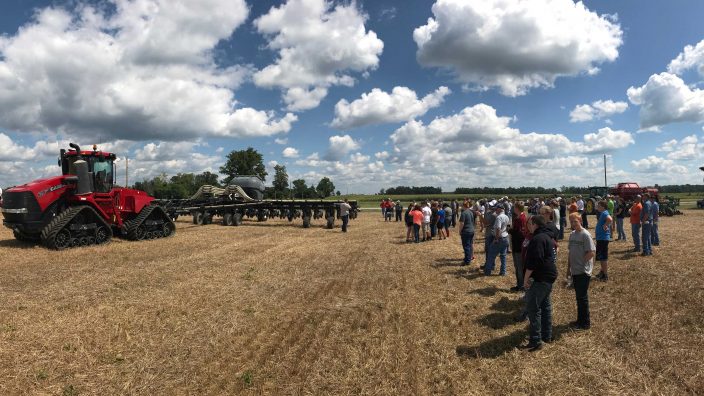Farmer’s Guide to Trucking Regulations available to Ohio Farm Bureau members
The guide includes a farm driver checklist, overview of state and federal regulations and exemptions, CDL qualifications and more.
Read More
Take a whole class or just take the test, which is better? Farmers will get to decide.
Those who apply fertilizer on 50 or more acres now have the option to take an exam or attend a three-hour course to get the required certification aimed at protecting water quality.
The exam is a new option the Ohio Department of Agriculture will offer to make it easier for farmers to get certified and yet ensure that those who are applying fertilizer know the safest measures. The exam option was one of the rule changes on fertilizer certification that went into effect Oct. 1.
The other changes include the following:
Since Sept. 30, growers who apply fertilizer to more than 50 acres have been required to be certified, a measure aimed at keeping nutrients from farm fields from contributing to algal blooms in Lake Erie and other bodies of water. Phosphorus and nitrogen in fertilizer can trigger the growth of algal blooms. Those blooms produce toxins in the water, making it unsafe to swim in or drink. And as the blooms decompose, they take oxygen from the water, depleting the supply available for other aquatic life. The extent of 2017 algal blooms in Lake Erie was the fourth most severe in a century, according to a November report from the National Oceanic and Atmospheric Administration.
All the recent changes are aimed at making the certification process less burdensome on farmers, said Peggy Hall, agricultural and resource law field specialist for Ohio State University Extension, the outreach arm of the College of Food, Agricultural, and Environmental Sciences at The Ohio State University.
OSU Extension provides training for applying fertilizer, focusing on teaching how to apply fertilizer at the correct rate, time and location in the field, to keep nutrients in the field and available to crops while increasing stewardship of nearby and downstream water resources.
“The goal of the entire program is that we constantly educate ourselves about how we are applying these fertilizers and make sure we understand the science behind it,” Hall said.
“Hopefully more education, more understanding and continued research will help with the runoff issue.”
Across Ohio, an estimated 3,700 private fertilizer applicators have certificates expiring in March 2018, according to records from the Ohio Department of Agriculture.
OSU Extension will begin offering recertification programs in nearly every county this fall and winter, said Mary Ann Rose, program director for OSU Extension’s Pesticide Safety Education Program.
“Most of the fertilizer recertification programs will be offered in combination with pesticide recertification meetings; farmers will have the option to attend either or both,” Rose said.
For more information, visit ODA’s website or nutrienteducation.osu.edu.


The guide includes a farm driver checklist, overview of state and federal regulations and exemptions, CDL qualifications and more.
Read More


The emergency fuel waiver to allow the sale of summer gasoline blends containing 15% ethanol will lengthen the period during which Americans can continue buying E15 from June 1 to Sept. 15.
Read More

The Small-Scale Food Business Guide covers federal and state regulations for selling food products such as raw meat, dairy, eggs, baked goods, cottage foods, fruits and vegetables, honey and more.
Read More

New resources and technology are broadening the different types of sales tools and strategies available to farmers.
Read More

ODA will enroll 500,000 acres into the program for a two-week sign-up period, beginning April 22, 2024, through May 6, 2024. Contact local SWCD offices to apply.
Read More

Katie Share of Columbus has been named ExploreAg and Youth Development Specialist for Ohio Farm Bureau.
Read More

Mary Klopfenstein of Delphos has been named Young Ag Professional and Ag Literacy Program Specialist for Ohio Farm Bureau.
Read More

The plan has been updated to give sole proprietors access to more rate stability and a smart solution that offers potential savings on health care.
Read More

The American Farm Bureau Federation, in partnership with Farm Credit, is seeking entrepreneurs to apply online by June 15 for the 2025 Farm Bureau Ag Innovation Challenge.
Read More

Adele Flynn of Wellington has been elected treasurer of the Ohio Farm Bureau Federation and now holds the third highest elected office in Ohio’s largest and most influential farm organization.
Read More